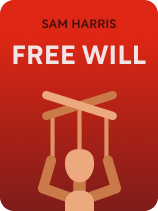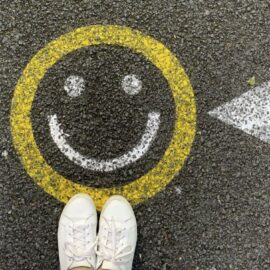
Do you believe that you have free will? If so, what might you be overlooking?
Sam Harris contends that free will is an illusion. But, most of us are absolutely convinced that it’s real. Harris says this is because we’ve accepted two misguided beliefs about our thinking and decision-making processes.
Keep reading to understand why people buy into the free will myth, according to Harris.
Why People Believe the Free Will Myth
Harris aims to dispel the free will myth by exposing two beliefs he says are just wrong. Let’s examine each of these beliefs and why we embrace them.
Belief #1: We Could Have Chosen to Behave Differently in the Past
First, Harris writes that we think we have free will because we look at a choice we made in the past and think we could have made a different decision in the same situation. This feels like proof of free will, but Harris argues that it’s illusory proof.
Harris argues that, given that our thoughts and actions are determined by prior causes, there’s no conceivable way that we could have chosen to behave differently in a given situation. If we were to replay the situation over and over again, and the circumstances stay consistent and the external factors influencing us stay the same, then our decision will always be the same.
| Free Will and the Ability to Do Otherwise The question of whether we could have chosen to behave differently in a given situation involves what philosophers call the “ability to do otherwise,” which many experts consider necessary for moral responsibility. Compatibilists and incompatibilists view this differently: Incompatibilists—like Harris—argue that we couldn’t have done otherwise if our actions are caused. Conversely, compatibilists contend that an external cause for our actions doesn’t rule out an ability to do otherwise if, by acting otherwise, we’d act according to our motivations. The question of whether we could do otherwise plays out hypothetically in the 1993 film Groundhog Day, where Bill Murray plays Phil, a weatherman who keeps reliving the same day. Philosopher Lawrence Crocker writes that at first, determinism seems to order Phil’s world: Each day plays out the same as the last, as if everyone’s actions are fully determined by external causes. Yet Phil begins to make different decisions—to act differently—based on what he’s learned. Crocker writes that for the most part, this is consistent with determinism because Phil starts each day with a different mind (with memories of the days prior). But, it might also illustrate compatibilism since his ability to do otherwise implies that he has free will. |
Belief #2: We Consciously Drive Our Thoughts and Actions in the Present
Second, Harris writes that we justify our belief in free will by believing that our thoughts and actions originate with us. He explains that we can disprove the idea that we’re the source of our thoughts by noticing that we have no control over the thoughts we think. To do this, Harris recommends observing how your thoughts and intentions arise: You’ll notice that you don’t decide what thoughts to think, just as you don’t decide what you prefer when choosing between vanilla and chocolate. Harris writes that our thoughts and preferences don’t originate with our conscious selves but instead just occur to our conscious selves. You can do what you want to do—but you can’t decide what you want.
(Shortform note: Many experts say that observing your thoughts can help you see that you don’t control them. In Mindfulness in Plain English, Bhante Gunaratana writes that the goal of meditation is an awareness of your thoughts, which you’ll see pass automatically through your mind. And, in Wherever You Go, There You Are, Jon Kabat-Zinn explains that thinking involves actively engaging with your thoughts, while mindfulness is stepping back from your thoughts to observe them. Some experts think that in addition to improving our awareness, mindfulness can enhance our ability to act freely: Philosopher Terry Hyland writes that practicing mindfulness can help us achieve a control over our mental processes that’s something like free will.)
Harris writes that another way to disprove the idea that we drive our own thoughts and actions is to look at empirical evidence. He explains that researchers have demonstrated that the brain processes information and makes choices before we’re aware of the decision—even though we feel like we’re consciously making the decision. For example, in laboratory experiments, researchers have detected brain activity that shows we intend to move 300 milliseconds before we have the thought that we intend to move. Similarly, neuroimaging techniques can be used to predict which button a research participant will choose to press as many as seven to 10 seconds before the person has consciously decided which button to press.
(Shortform note: Some experts say that all we can conclude from the experiments Harris cites is that observable physiological processes underpin our decisions. Philosopher Alfred Mele writes in Free Will and Luck that such research has other, more plausible interpretations than Harris’s: These studies look at “readiness potential,” brain activity that precedes voluntary movement. Mele argues that the presence of this activity doesn’t prove that a decision has been made subconsciously; it simply shows that a distinctive pattern of brain activity precedes a conscious decision. Alternatively, philosopher Adina Roskies explains that new computational models suggest that readiness potential might be an experimental “artifact or illusion,” not a real brain signal.)
Exercise: Think About Your Opinions on Free Will
Harris’s central argument is that free will is an illusion, and his purpose in writing the book was to convince readers that they don’t really have as much control over their choices as they might think. Reflect on whether you agree or disagree with Harris’s point of view.
- Do you agree with Harris’s argument that we don’t have free will? Why or why not?
- Think back to an important decision you made. What outside factors influenced your decision? List them here.
- Consider how you ultimately made your choice. Do you think that you were in control of your decision, or was your choice determined by outside factors?
- How has the material in Harris’s book changed the way you think about free will?

———End of Preview———
Like what you just read? Read the rest of the world's best book summary and analysis of Sam Harris's "Free Will" at Shortform.
Here's what you'll find in our full Free Will summary:
- That free will is an illusion that you should abandon altogether
- How our thoughts, feelings, and desires are caused by outside influences
- Why putting effort into decisions matters, even if they're predetermined






